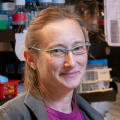DIRECTORSHIP
DIRECTORS
Anne Brunet, PhD
 The Brunet laboratory studies the molecular basis of aging and longevity. The Brunet lab is interested in the fundamental mechanisms underlying aging and how these mechanisms are regulated by environmental factors such as diet, exercise, and sexual interactions. The Brunet lab also has a particular interest in brain aging and rejuvenation, focusing on strategies that boost the regenerative potential of old neural stem cells. Finally, the Brunet lab is pioneering the naturally short-lived African killifish as a powerful vertebrate model to study aging and discover new principles underlying the regulation of lifespan and ‘suspended animation.’
The Brunet laboratory studies the molecular basis of aging and longevity. The Brunet lab is interested in the fundamental mechanisms underlying aging and how these mechanisms are regulated by environmental factors such as diet, exercise, and sexual interactions. The Brunet lab also has a particular interest in brain aging and rejuvenation, focusing on strategies that boost the regenerative potential of old neural stem cells. Finally, the Brunet lab is pioneering the naturally short-lived African killifish as a powerful vertebrate model to study aging and discover new principles underlying the regulation of lifespan and ‘suspended animation.’
Karlene Cimprich, PhD

The Cimprich lab studies both the causes and consequence of DNA damage and replication stress, which are associated with various human diseases and aging. We study the mechanisms by which cells recognize and respond to these factors, as well as their endogenous sources in cells. We are particularly interested in transcription-associated DNA damage as a cause of replication stress and a source of nucleic acids that may trigger immune responses and other age-associated events. We aim to understand how DNA damage and replication stress increase with age, the molecular mechanism by which they may lead to common hallmarks of aging and ultimately their contribution to aging.
Judith Frydman, PhD

The Frydman laboratory is interested in understanding how aging impairs protein homeostasis, leading to increased protein aggregation, and reduces the resilience and stress resistance of aged cells. The Frydman lab is discovering fundamental mechanisms of age-dependent decline in the protein homeostasis networks of cells, including chaperones, organelles and clearance pathways such as the proteasome and autophagy. To this end, we employ molecular and cellular approaches using model systems such as yeast, C. elegans and patient-derived human cells.
